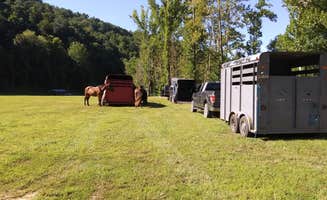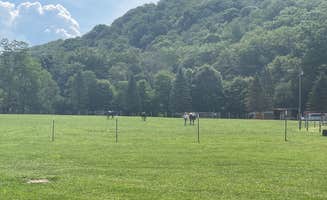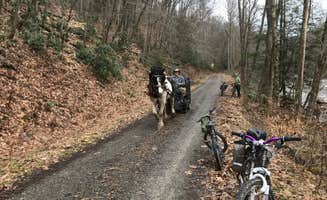The Monongahela National Forest region surrounding French Creek, West Virginia sits at elevations between 1,800 and 4,800 feet, creating diverse camping conditions throughout the seasons. The area receives significant rainfall annually, particularly in spring, making waterproof gear essential for campers. Trail and campsite conditions vary dramatically between seasons, with September offering optimal conditions for equestrians.
What to do
Trail riding networks: 60+ miles. Monongahela National Forest offers extensive horse-friendly trails connecting to Kumbrabow State Forest, located at 3,000 feet elevation. "This historic recreation area, carved into this 9,500-acre forest by the Civilian Conservation Corps in the 1930's, is a wonderful place to unplug and unwind. It's located at 3,000 feet above sea level on the western edge of the Allegheny Highlands, so it's the highest state forest in West Virginia," notes Jennifer B.
Waterfall exploration: 3-4 hour trips. Multiple cascades are accessible via horseback throughout the region, including at Holly River State Park. "The park has a total of 4 waterfalls to explore. They have basketball, tennis, and volleyball courts, and a pool for campers to enjoy," explains Hannah V. The waterfalls require careful navigation on horseback due to slippery conditions.
Overnight pack trips: 2-5 days. Extended backcountry riding trips can utilize Gandy Creek Dispersed Camping for overnight stays. "Each site is secluded and creek front. We stayed at the last site with the cliff over hang and it was magical," reports Sandra B. Riders should bring portable corrals for overnight use as permanent facilities are limited.
What campers like
Creek access for horses: Numerous sites allow direct water access for horses, particularly at Laurel Fork Campground. "Our site was right on the creek and the sound was awesome for sleeping. Biggest surprise, given the location on the creek and remoteness of the campground (settled deep in the woods), there were No Bugs to speak of!" reports Dana M. Horses can drink and cool off at designated creek entry points.
Spacious sites for trailers: The region offers camping areas specifically designed to accommodate horse trailers. "Very well run clean campgrounds. We had a river lot which was beautiful. Restaurant, Shavers Saloon, was walking distance and had full bar with good food," notes Todd C. about Revelle's River Resort.
Remote locations for solitude: Many equestrian campers appreciate the secluded nature of camps. "Very remote. Two small circles of sites the only amenity is pit toilets. The stream is stocked with trout in the spring and fall. My wife and I spent our honeymoon here 25 years ago and plan to return there this fall," shares Tim M. about Laurel Fork Campground.
What you should know
Weather variability: The elevation creates unpredictable conditions. "Every morning and every night it rained which made it difficult to swim and fish. The park workers said this is common year round," explains Elaine L. at Holly River State Park. Pack extra tarps and rain gear for both riders and horses.
Limited cell service: Most horse campgrounds near French Creek operate in signal-free zones. "There was no phone signal at all for Verizon service, so a nice place to disconnect," notes Cassia M. Bring paper maps and emergency communication devices.
Limited amenities: Many sites lack full facilities. "No laundry, showers or wifi. The price was $40 a night full hookups," reports John R. about Elk River Camp and RV Park. Plan for self-contained camping with limited access to supplies.
Tips for camping with families
Fishing opportunities: Children can fish while adults tend to horses. "The stream is stocked with trout in the spring and fall," states Tim M. Bring fishing gear appropriate for mountain streams.
Kid-friendly water features: Safe swimming areas exist near horse camps. "There is a pool and other activities available. We stayed at sites 35 & 36," mentions Missy S. about Holly River State Park. Swimming locations offer cooling options after riding.
Playground facilities: Some campgrounds maintain play areas. "This campground has plenty to offer for the whole family. The privacy of each site varies, on the weekends it is very busy though," advises Hannah V. Schedule arrival on weekdays when possible for better site selection.
Tips from RVers
Road conditions: Access roads to horse campgrounds can challenge larger rigs. "Lengthy dirt road drive to get there, No cell coverage or Wi-Fi, 2 mile drive to bath house," cautions C.S. about Kumbrabow State Forest. Scout routes beforehand or use smaller tow vehicles when possible.
Site leveling: Many horse-friendly sites require significant leveling. "Very quite nice rangers and very helpful. Very quiet nice rangers and very helpful," notes Brett W. about Holly River, adding that "some spots a little tight for bigger camper we have a 30' but we were okay."
Seasonal closures: Most horse campgrounds operate seasonally. "We spent a few days here. Plenty of camp sites that have electric hookups. Stay near the water or further away," advises Elaine L. Check operating dates before planning extended stays as most close between November and April.




